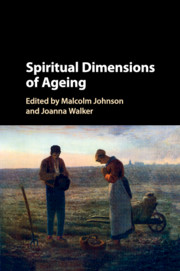Book contents
- Frontmatter
- Contents
- List of Contributors
- Preface
- Acknowledgements
- 1 Spirited Ageing
- Part I The Spiritual Journey of Ageing
- 2 Spirituality and Ageing: Yesterday, Today and Tomorrow
- 3 Ageing and Spirituality across Faiths and Cultures
- 4 Stages of the Soul and Spirituality in Later Life
- 5 Aesop's Fables as Spiritual Touchstones for Ageing
- Part II Cultures of the Spirit in Modernity
- Part III Searching for Meaning in Later Life
- Part IV Meeting Spiritual Needs in Older Age
- Index
- References
2 - Spirituality and Ageing: Yesterday, Today and Tomorrow
from Part I - The Spiritual Journey of Ageing
Published online by Cambridge University Press: 22 December 2016
- Frontmatter
- Contents
- List of Contributors
- Preface
- Acknowledgements
- 1 Spirited Ageing
- Part I The Spiritual Journey of Ageing
- 2 Spirituality and Ageing: Yesterday, Today and Tomorrow
- 3 Ageing and Spirituality across Faiths and Cultures
- 4 Stages of the Soul and Spirituality in Later Life
- 5 Aesop's Fables as Spiritual Touchstones for Ageing
- Part II Cultures of the Spirit in Modernity
- Part III Searching for Meaning in Later Life
- Part IV Meeting Spiritual Needs in Older Age
- Index
- References
Summary
Introduction
This chapter clarifies and deepens concepts of spirituality, spiritual development, and spiritual journeying. It draws on theory and data from recent gerontology to make the case for a strong relationship between ageing and adult development and various aspects of spirituality. It looks at evolution in the study of spirituality within the field of ageing from the 1960s to the present, particularly the evolution of spiritual seeking and spiritual practice in post-modern culture. Finally, it addresses implications for further study, education, and practice in the area of spirituality and ageing.
Spirituality is primarily an inner experience of being that infuses a person with energy, offers a vantage point for transcending the personal self, opens the experiencer to awareness of a vast inner space, and perhaps offers direct experience of the ‘ground of all being’ (God, Allah, Jahweh, Nirvana, The Absolute). Spirituality is a very important part of life for most elders.
The essence of spirituality is the capability to experience pure being, an intense sense of presence, unadulterated by concepts, language, and other elements of culture. Pure being is often experienced as inner space, silence, stillness, or peace. It is through the experience of pure being that people report being most likely to experience union with the ground of being. The experience of pure being is a vantage point from which we can see the spiritual aspects of all other experiences.
When accompanied by awareness of pure being, the events of ordinary life have the potential to evoke qualities of experience that we call spiritual – qualities such as wonder and awe, deep insight, mental clarity, compassion, or feeling of direct connection with the ground of being. Spiritual aspects of experience may be seen more easily in some activities than in others. For example, being in nature, engaging in art or music, performing religious devotions, relating with others, or engaging in service are often-mentioned avenues of spiritual experience, but the number of activities that can evoke spiritual experience is very large indeed (Atchley 2009).
Although humans are born with the capacity for spiritual experience (Trimble 2007), we must learn to perceive pure being and its relationship with other experiences if we want to be conscious of them. Capacity must be converted to capability.
- Type
- Chapter
- Information
- Spiritual Dimensions of Ageing , pp. 13 - 31Publisher: Cambridge University PressPrint publication year: 2016
References
- 3
- Cited by

